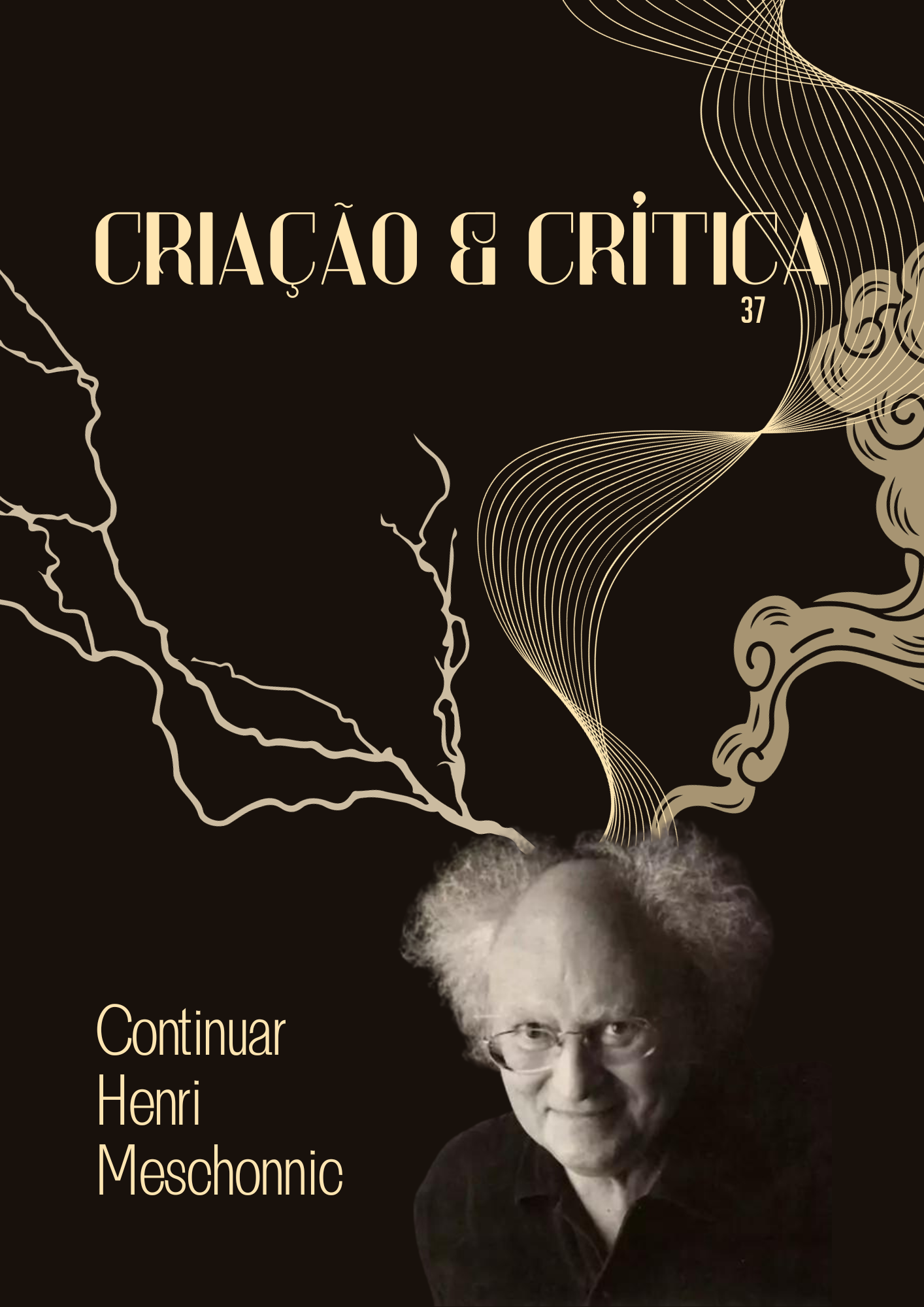Still the rhythm: Meschonnic and Homer’s translation
DOI:
https://doi.org/10.11606/issn.1984-1124.i37p167-180Keywords:
Henri Meschonnic, Homer, Rhythm, Poetry, Metrics, MusicAbstract
This brief text seeks to think about some conditions for continuing Henri Mechonnic's thinking, considering the contradictions and challenges that constitute his work, especially with regard to the relationship between poetry, meter and music. If, as the French poet, theorist and translator argues, rhythm is not meter, what do meter and music do with the rhythm of language? There is no definite answer, and that is why the question calls for returns and tensioning. What I'm presenting here is a reflection on how Meschonnic chose to translate two verses from Homer's Iliad, in order to think about the implication of the translated meter and its relationship with rhythm.
Downloads
References
BENVENISTE, É. Problemas de linguística geral. São Paulo: Ed. Nacional, 1976.
CAMPOS, Haroldo de. Bere’shith: a cena da origem. São Paulo: Perspectiva, 1993.
CAMPOS, Haroldo de. Qohélet = O-que-sabe: Eclesiastes: poema sapiencial. São Paulo: Perspectiva, 2004a.
CAMPOS, Haroldo de. Éden: um tríptico bíblico. São Paulo: Perspectiva, 2004b.
FLORES, Guilherme Gontijo. Da tradução em sua crítica: Haroldo de Campos e Henri Meschonnic. Circuladô. São Paulo, ano IV, n. 4., 2016, pp. 9-25.
FLORES, Guilherme Gontijo & GONÇALVES, Rodrigo Tadeu. Algo infiel: corpo performance tradução. São Paulo/Florianópolis: n-1/Cultura e Barbárie, 2017.
FLORES, Guilherme Gontijo & CAPILÉ, André. Tradução-exu [ensaio de tempestades a caminho]. Belo Horizonte: Relicário, 2022.
KLEIN, Rony. De l’universel au texte: entre pensée juive e philosophie française dans les années 1960-1970. Pardès: études et culture juives. Paris, n. 49, 2011, p. 155-178.
MESCHONNIC, Henri. Pour la poétique. Paris: Gallimard, 1970.
MESCHONNIC, Henri . Les cinq rouleaux.: Le Chant des chants, Ruth, Comme ou les Lamentations, Paroles du Sage, Esther. 2.ed. Paris: Gallimard, 1986 [1970].
MESCHONNIC, Henri. Jona et le signifiant errant. Paris: Gallimard, 1981.
MESCHONNIC, Henri. Critique du rythme: Anthropologie historique du langage. Paris: Verdier, 1982.
MESCHONNIC, Henri. Politique du rythme, politique du sujet. Paris: Verdier, 1995.
MESCHONNIC, Henri. Poétique du traduire. Paris: Verdier, 1999.
MESCHONNIC, Henri. Gloires: traductions des psaumes. Paris: Desclée de Brouwer, 2001.
MESCHONNIC, Henri. La rime et la vie. Édition revue et augmentée. Paris: Gallimard, 2006 [1989].
MESCHONNIC, Henri. Poética do traduzir. Trad. Jerusa Pires Ferreira e Suely Fenerich. São Paulo, Perspectiva: 2010.
MESCHONNIC, Henri. Langage, histoire, une même théorie. Paris: Verdier, 2012.
NEUMANN, Daiane. Do sistema de signos à teoria do ritmo: Um olhar sobre os estudos da linguagem. Estudos da Lingua(gem). Vitória da Conquista, v.11, n. 2, 2013, p. 121-136.
VERSHAGEM, Marina Bento. "A tradução do ritmo em Henri Meschonnic a partir da teoria de Émile Benveniste”. Linguagem & Ensino. Pelotas, v. 23, n. 3, 2020, pp. 649-661.
Downloads
Published
Issue
Section
License

This work is licensed under a Creative Commons Attribution-NonCommercial-ShareAlike 4.0 International License.
Authors who publish with this journal agree to the following terms:
- Authors retain copyright and grant the journal right of first publication with the work simultaneously licensed under a Creative Commons Attribution License that allows others to share the work with an acknowledgment of the work's authorship and initial publication in this journal.
- Authors can enter into separate, additional contractual arrangements for the non-exclusive distribution of the journal's published version of the work (e.g., post it to an institutional repository or publish it in a book), with an acknowledgment of its initial publication in this journal.
- Authors are permitted and encouraged to post their work online (e.g., in institutional repositories or on their website) before and during the submission process, as it can lead to productive exchanges, as well as earlier and greater citation of published work (See The Effect of Open Access).



